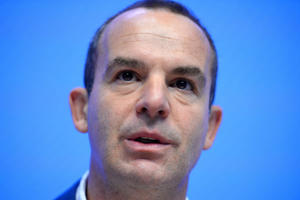
© PA Archive Mortgage holders
Money-saving expert Martin Lewis has risen to the occasion in 2022 like few others, helping millions of people to navigate a disastrous cost of living crisis with proactive and positive financial advice at a time when many are having to make sacrifices in order to make ends meet.
Bringing sincerity, sympathy and sound advice to his appearances on his ITV programme The Martin Lewis Money Show Live, via his BBC podcast, his website and newsletter and through his regular media interviews, Lewis is providing an invaluable public service.
No concern is too small to warrant his attention and, in the latest episode of The Martin Lewis Podcast, the financial guru had some timely tips for listeners concerned about exorbitant energy bills and seeking greater payment flexibility, a particularly pressing concern given the arrival of sub-zero temperatures this December.
“I know many people find them extremely frustrating,” Lewis said of paying off energy bills by Direct Debit.
“You’re in credit, you’ve been doing your meter readings and yet your Direct Debit has increased and you think it’s disproportionate. It’s worth understanding there are two types of Direct Debits.
“The most common one is a fixed-monthly Direct Debit, that’s where your costs are spread out over the year. Your supplier estimates how much you’ll use over the next year and splits the payments equally with the idea of it making budgeting easier. You pay the same amounts in the high-use colder winter months that we’re going into that you do in the lower-use summer months.”
UP NEXT
He continued: “There is another alternative though available at some, not all companies and of the big ones, Ovo and SSE for example, don’t do this.
“That alternative is a variable monthly Direct Debit. Now there, what you pay changes depending on what you use. To do this you must either have a working smart meter or give meter readings each month.
“If you do that, then you will only pay, by Direct Debit, for the amount that you have used in the last month.
“Of course, that means you need to expect much, much higher bills in the winter and much, much lower bills in the summer so this can be a cashflow hit and you’ll generally get a bill a few weeks before your payment is due to go out letting you know how much your provider wants from you – but some do get a shock when doing it this way.”
However, he warned listeners not to leap from fixed to variable schedules without thinking about it carefully because the former can be a “big boon for budgeting and, done right, it should make your life easier, so if it isn’t an issue for you, stick with it”.
“The problem comes when you feel their estimated Direct Debit is wrong and usually the real frustration comes when you think it’s too high, especially if you’ve built up a lot of credit.”
Anyone in this situation, Lewis suggested, would be best advised to hook up a smart meter, submit regular readings from that and check an online Direct Debit calculator to determine whether what they are paying out is fair.
“If it isn’t, then talk to your energy provider and get them to lower it,” he said.
“If that then doesn’t work to your satisfaction, it’s at that point you might want to look at going to variable Direct Debit… [But] you will have to be prepared to shell out more in the winter and see big swings in what you pay.”
Explaining the difference between the two forms of payment, Lewis said: “If you pay in receipt of bill – where you get a bill and then pay it by any other means other than Direct Debit such as cash, card or Bacs – you’re on the highest possible rate and effectively paying around 10 per cent more for your energy usage than you would if you paid by Direct Debit.
“If you want the flexibility of just paying for what you use, do it by variable Direct Debit, not by payment in receipt of bill.”
From news to politics, travel to sport, culture to climate – The Independent has a host of free newsletters to suit your interests. To find the stories you want to read, and more, in your inbox, click here.
